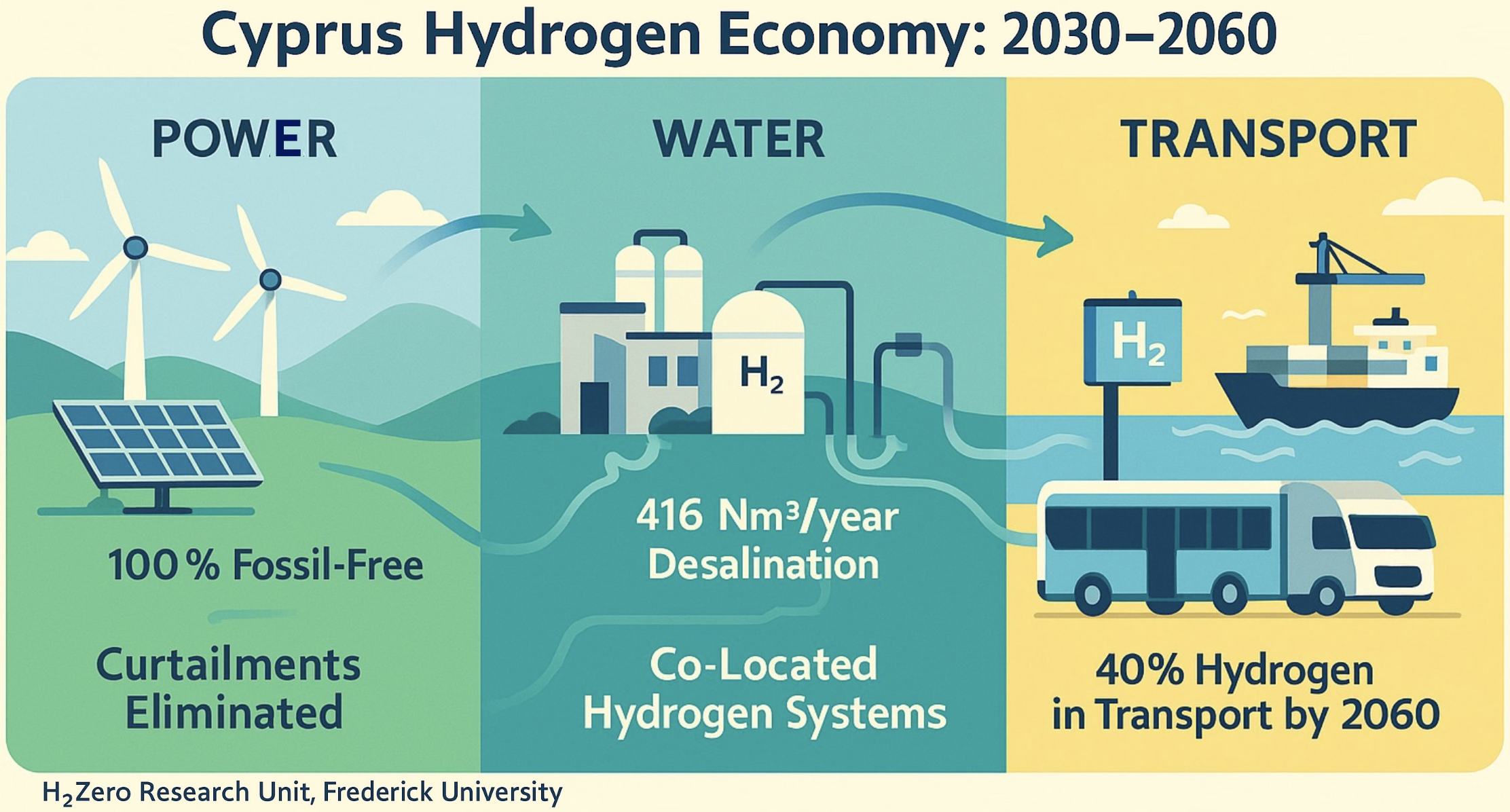Cyprus on track for a Hydrogen Economy by 2060, according to study by Frederick University
The H2Zero Research Unit at Frederick University has unveiled a comprehensive strategic plan for Cyprus’s transition to a fully carbon-free hydrogen economy between 2030 and 2060. This initiative is underpinned by a sophisticated mathematical optimisation model that integrates the development of the energy, water and transport sectors, focusing on investments in renewable energy sources, hydrogen infrastructure and small modular reactors.
The study demonstrates that it is possible to achieve zero carbon dioxide emissions by 2060, while forecasting significant penetration of hydrogen in the transport sector, expected to reach 40 per cent. The cost of green hydrogen production is projected to decrease by 66 per cent by 2060, while electricity surpluses will be eliminated using electrolysis units and electrical interconnections.
Small modular reactors are likely to play a critical role after 2035, supporting both the production of pink hydrogen and water desalination, while the country’s energy security is ensured through interconnection with European partners and water security through increased production of desalinated water.
Electricity generation is gradually shifting from fossil fuels to renewables and small modular reactors. Solar power increases from 800 megawatts to 7,000 megawatts, while the capacity of small modular reactors reaches 2,860 megawatts by 2060. Hydrogen production exceeds 500,000 tons annually, with the cost of green hydrogen dropping below 2 dollars per kilogramme after 2050.
The average cost of hydrogen in Cyprus’s energy system is expected to settle at $1.78 per kilogramme by 2060.
At economic level, average annual investments reach $1 billion, with cumulative savings of $38.2 billion expected from reduced fuel imports and $14.6 billion from avoided purchases of carbon emission allowances. The cost of vehicle ownership is expected to decrease by $3,200 per vehicle annually by 2040.
Based on the simulation results, proposed policies include investments in electrolysis unit infrastructure to accelerate green hydrogen production, the gradual phase-out of fossil fuels starting in 2030 and their complete withdrawal by 2045, the potential development of small modular reactors from 2035 to provide clean baseload power, incentives in the transport sector to achieve 40 per cent hydrogen penetration by 2060, as well as coordinated planning of the water-energy sector so that desalination aligns with renewable energy availability.
Additionally, the development of hydrogen refueling infrastructure and the establishment of strategic export partnerships with European countries are proposed.
Overall, Cyprus’ transition to a hydrogen economy is deemed technically feasible and economically viable. The integrated approach to the energy, water, and transport sectors demonstrates how targeted investments can achieve full decarbonisation, energy and water security and clean alternatives in the transport sector.

“The transition of our country to a hydrogen economy is not just an environmental choice; it is a strategic necessity for Cyprus’ energy and water security”, notes Professor of Energy Systems at Frederick University’s School of Engineering, AndreasPoullikkas. Prof. Poullikkas, who leads theH2Zero Research Unit, further comments: “Our mathematical model shows that with proper planning and timely investments, Cyprus can achieve full decarbonisation without affecting its economic prosperity. Our vision is for Cyprus to export clean energy, ensure affordable and stable water supplies and advance with clean technologies, all powered by hydrogen. We invite young scientists to contribute to this effort through our research programs and doctoral studies with preferential financial support.”
For further information:
Meropi Moiseos, Communications Officer, Communications and Outreach Service
T. +357 22394394 (ext.41139) | E. [email protected]
About Frederick University
Frederick University operates in the Republic of Cyprus since September 2007. Although the establishment of the University is relatively recent, the organisation has a long history of nearly 60 years in higher education. Its mission is to serve the society through education, research, and social contribution to the broader community.
The University offers a broad range of academic programs of study in the areas of Engineering, Technology, Business, Maritime Business, Arts, Architecture, Media, Humanities, Health, and Education, and operates from two campuses, in Nicosia and in Limassol.
With its dedication to academic excellence, provision of high-quality programs of study and active research, the University enjoys respect and recognition both nationally and internationally. In the Times Higher Education Impact Rankings 2024, it ranked among the top 201-300 universities for the second consecutive year, the only university in Cyprus to ever achieve this.






Click here to change your cookie preferences